
1) Lab students placed ten spinach leaf disks in each of three test tubes containing a baking soda solution and a control tube without baking soda. The volume of liquid in each tube and the temperature of the solutions were held constant. All tubes were placed an equal distance from a light source as indicated in the accompanying table. After 10 minutes, the amount of oxygen present in each sample was measured. Which tube is expected to contain the greatest quantity of oxygen?
A. TUBE 1
B. TUBE 2
C. TUBE 3
D. TUBE 4
C

2) Lab students placed ten spinach leaf disks in each of three test tubes containing a baking soda solution and a control tube without baking soda. The volume of liquid in each tube and the temperature of the solutions were held constant. All tubes were placed an equal distance from a light source as indicated in the accompanying table. After 10 minutes, the amount of oxygen present in each sample was measured.
A. TUBE 1
B. TUBE 2
C. TUBE 3
D. TUBE 4
D
3) What are the products of linear electron flow in the light reactions of photosynthesis?
A. ATP and NADPH
B. heat and fluorescence
C. ADP and NADP+
D. ATP and P700
A
4) A mutation that disrupts cyclic electron flow in the light reactions of photosynthesis will specifically reduce the production of which of the following molecules?
A. ADP and NADP+
B. NADPH
C. CO2
D. ATP
D
5) A greenhouse becomes excessively hot from too much sunlight. One solution is to shade the plants with colored translucent plastic sheets, the color of which allows passage of only that wavelength of light. Which of the following colors would reduce the overall light energy without reducing plant growth?
A. blue
B. green
C. orange
D. yellow
A
6) A flask containing photosynthetic green algae and a control flask containing only water are exposed to a cycle of 12 hours of light and 12 hours of darkness. Which of the following statements best describes how the relative dissolved oxygen concentration in the flask with algae will compare to the control flask?
A. It will always be lower in the control.
B. It will always be higher in the control.
C. It will be lower in the control in the light, but the same in the dark.
D. It will be lower in the control in the light, but higher in the control in the dark.
D
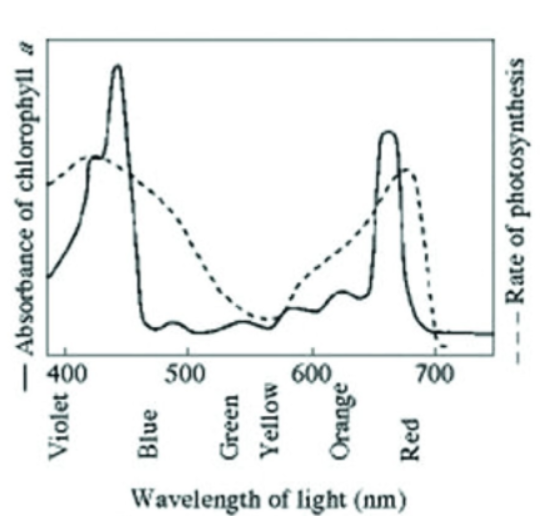
7) The accompanying figure shows the absorption spectrum for chlorophyll a and the action spectrum for photosynthesis. Which of the following statements best explains the low rate of photosynthesis at 550 nm?
A. Oxygen given off during photosynthesis interferes with the absorption of light.
B. Green and yellow wavelengths inhibit the absorption of red and blue wavelengths.
C. Other photosynthetic pigments absorb light in addition to chlorophyll a.
D. Chlorophyll a does not absorb 550 nm light well.
D

8) Based on the accompanying figure, which of the following wavelengths of light is most effective in driving photosynthesis?
A. 720 nm
B. 440 nm
C. 575 nm
D. 660 nm
B
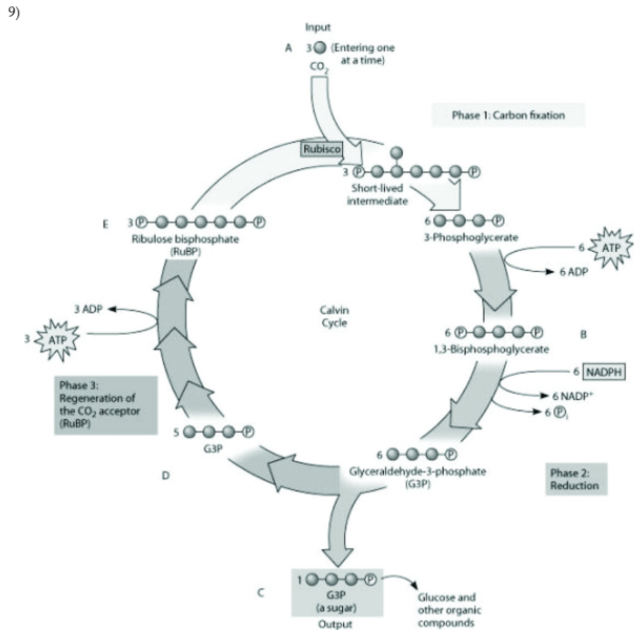
9) If photosynthesizing green algae are provided with CO2 containing heavy oxygen (18O), which of the following molecules produced by the algae (refer to the accompanying figure) would be least likely to contain 18O in subsequent analyses?
A. 3-phosphoglycerate
B. ribulose bisphosphate (RuBP)
C. ADP
D. glyceraldehyde 3-phosphate (G3P)
C
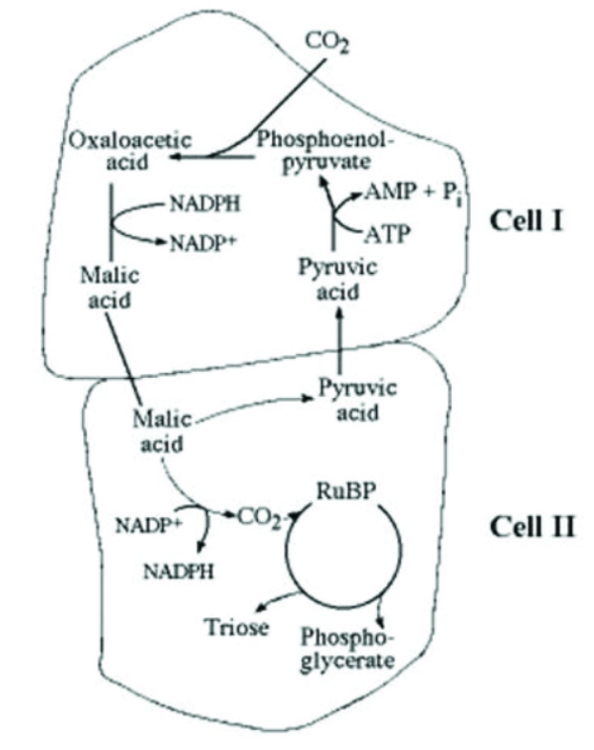
10) In which cell of the accompanying figure would elevated oxygen concentrations have the greatest inhibitory effect on carbon fixation reactions?
A. cell I only
B. cell II only
C. neither cell I nor cell II
D. both cell I and cell II
B

11) The phyllotaxy of mature shoots can be described by a phyllotactic fraction where the numerator indicates the number of times you must go around the stem to get to another leaf directly above (or below) the starting leaf and the denominator indicates the number of leaves passed through to get back in-line with the starting leaf. These two numbers can also be used to calculate the angle between successive leaves. The most common patterns are summarized in the table below. What is an advantage to plants as the numbers of leaves passed through increase?
A. The angle between leaves approaches 137.5o which minimizes shading of lower leaves by upper leaves.
B. The shoot apex will get larger as it produces larger numbers of leaves.
C. The phyllotactic fraction is random, so a "counting mechanism" is not necessary.
D. The number of leaves passed through will always increase at a faster rate than the number of times around the stem so there will be more photosynthesis.
A
12) Which of the following would be least likely to affect osmosis in plants?
A. receptor proteins in the membrane
B. a difference in water potential
C. a difference in solute concentrations
D. aquaporins
A
13) The value for Ψ in root tissue was found to be -0.15 MPa If the root tissue were placed in a 0.1 M solution of sucrose (Ψ = -0.23 MPa) the net water flow will be in which of the following directions?
A. in both directions, and the concentration of water would remain equal
B. from the tissue into the sucrose solution
C. from the sucrose solution into the tissue
D. impossible to determine from the values given here
B
14) If you place a flaccid plant cell in pure water, which of the following will occur?
A. Water will not enter the cell because the flaccid cell has solutes and low water potential.
B. Water enters the cell because the flaccid cell has solutes and low water potential.
C. Water will not enter the cell because the flaccid cell has solutes and high water potential.
D. Water enters the cell because the flaccid cell has solutes and high water potential.
B
15) If Ψ P = 0.3 MPa and ΨS = -0.45 MPa what will be the resulting Ψ?
A. -0.75 MPa
B. +0.15 MPa
C. -0.15 MPa
D. +0.75 MPa
C
16) The value for Ψ in root tissue was found to be -0.15 MPA. Which of the following best describes water flow if the root tissue was placed it in a 0.1 M solution of sucrose (Ψ = -0.23 MPa)?
A. Water would flow from the sucrose solution into the tissue.
B. Water would flow only if ATP was hydrolyzed in the tissue.
C. Water would flow from the tissue into the sucrose solution.
D. Water would flow in both directions and the concentrations would remain equal.
C
17) Long-distance transport in phloem requires which of the following processes?
I) a positive water potential
II) active transport through parenchyma cells
III) cohesion between water molecules
IV) evaporation of water molecules
A. I and II only
B. II and III only
C. I, II, and III only
D. I, II, III, and IV
C
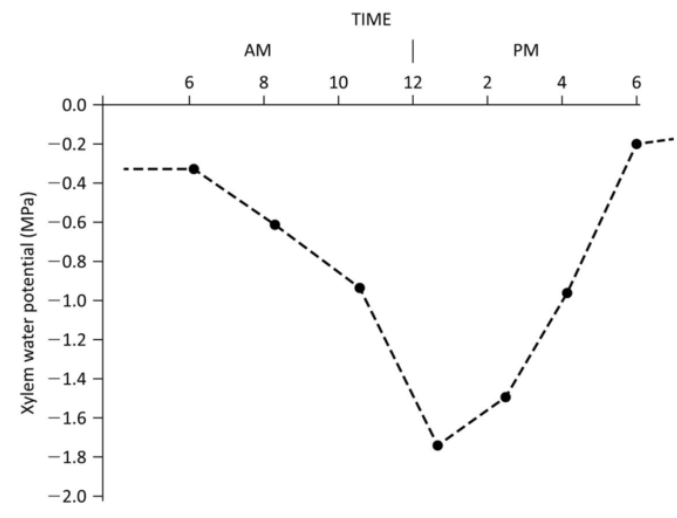
18) The graph below shows daily water potential in the xylem of a woody plant. Which of the following statements is best supported using the data?
A. High water potential results in greater transpiration.
B. Water potential decreases, beginning around 6 AM, because of increased mineral uptake.
C. Increasing pressure potential after noon results in decreasing water potential.
D. dWater potential at noon is a reflection of high rates of transpiration.
D
19) Ignoring all other factors, what weather conditions would result in the fastest delivery of water and minerals to the leaves of an oak tree?
A. a cool, dry day
B. a cool, humid day
C. a warm, humid day
D. a warm, dry day
D
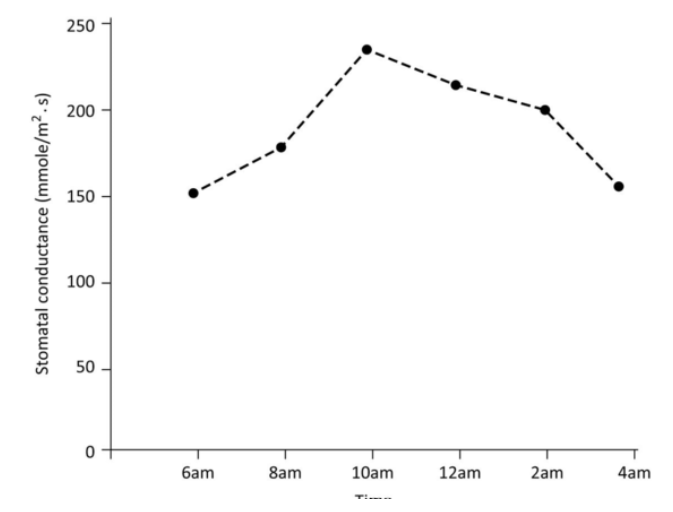
20) Based on the figure, at what time of day is the concentration of the hormone ABA most likely to be highest?
A. 8 AM
B. 12 PM
C. 4 PM
D. 10 AM
C
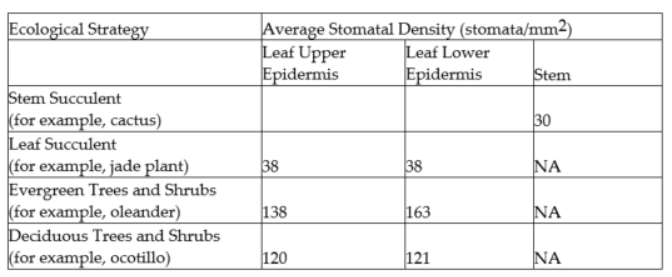
21) Xerophytes employ a number of different strategies to survive in very dry environments. The following table summarizes average stomatal densities from desert plants with four different ecological strategies. Based on the data, plants adopting which ecological strategy are most likely to have stomata sunken below the epidermis or in crypts?
A. evergreen trees and shrubs
B. stem succulents
C. deciduous trees and shrubs
D. leaf succulents
A
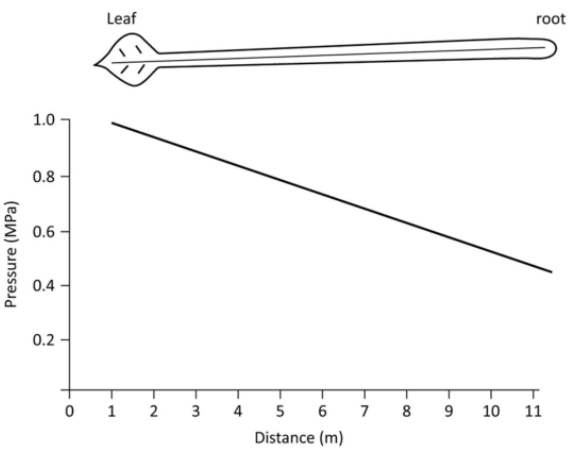
22) Pressure data, measured from one of the vascular tissue types connecting leaf to root in a 11 m tall tree, is presented in the graph below. Which of the following is the most appropriate title for this graph?
A. xylem flow from root to leaf
B. phloem flow from leaf to root
C. xylem flow from leaf to root
D. phloem flow from root to leaf
B
23) Which of the following could occur after plants moved from the oceans to land?
A. Plants in the oceans were able to evolve forms that lived in much deeper parts of the oceans.
B. Cyanobacteria could also move onto land because their host plants occurred there.
C. Animals could also move onto land because they had easier access to nitrogen.
D. Animals could also move onto land because there were opportunities for new food sources.
D
24) You find a green organism in a pond near your house and believe it is a plant, not an alga. Which of the following characteristics would best support your identification of the organism as
A. It lacks vascular tissue
B. It has cell walls that are comprised largely of cellulose
C. It contains chloroplasts
D. It is surrounded by a cuticle.
D
25) In plants, which of the following is a benefit of retaining the zygote on the living gametophyte?
A. it protects the zygote from herbivores
B. it helps in dispersal of the zygote
C. It helps in dispersal of pollen
D. it allows it to be nourished by the parent plant
D
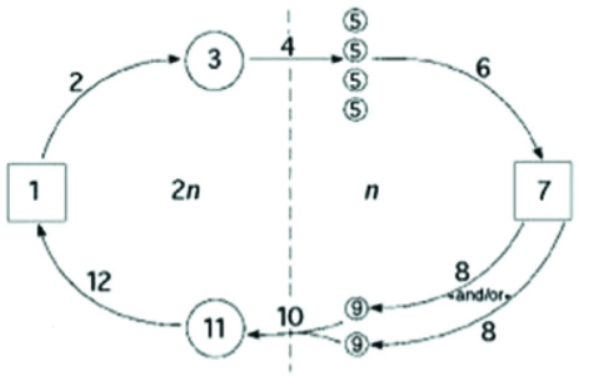
26) The following question refers to the generalized life cycle for plants shown in the figure. Each number within a circle or square represents a specific plant or plant part, and each number over an arrow represents meiosis, mitosis, or fertilization. In the figure, which number represents the mature gametophyte?
A. 3
B. 11
C. 1
D. 7
D

27) The following question refers to the generalized life cycle for plants shown in the figure. Each number within a circle or square represents a specific plant or plant part, and each number over an arrow represents meiosis, mitosis, or fertilization. In the figure, which number represents an embryo?
A. 3
B. 11
C. 1
D. 7
B

28) The following question refers to the generalized life cycle for plants shown in the figure. Each number within a circle or square represents a specific plant or plant part, and each number over an arrow represents meiosis, mitosis, or fertilization. In the figure, meiosis is most likely to be represented by which number(s)?
A. 2
B. 4
C. 2 and 8
D. 10 and 12
B

29) The following question refers to the generalized life cycle for plants shown in the figure. Each number within a circle or square represents a specific plant or plant part, and each number over an arrow represents meiosis, mitosis, or fertilization. Which number represents a megaspore mother cell in the figure?
A. 5
B. 7
C. 1
D. 3
D

30) The following question refers to the generalized life cycle for plants shown in the figure. Each number within a circle or square represents a specific plant or plant part, and each number over an arrow represents meiosis, mitosis, or fertilization. In the figure, the process labeled "6" involves ________.
A. meiosis
B. binary fission
C. fertilization
D. mitosis
D
31) Which of the following is a similarity between bryophytes and seedless vascular plants?
A. Plants in both groups have vascular tissue.
B. Plants in both groups have true roots, stems, and leaves.
C. The dominant generation in both groups is the sporophyte.
D. In both groups, sperm swim from antheridia to archegonia.
D
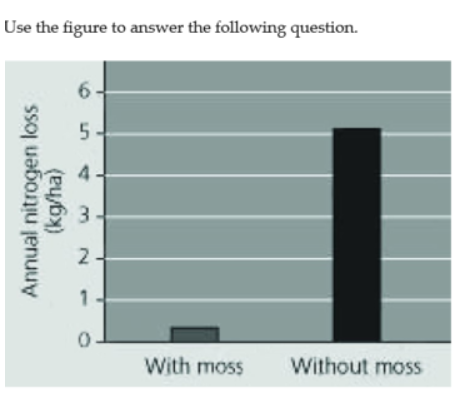
32) The graph summarizes the results of Richard Bowden's study showing the effect that the presence or absence of moss had on the amount of nitrogen in soil. Which of the following claims would be best supported using the data?
A. soils with and without moss both exhibit an increase in the amount of nitrogen present
B. the presence of moss increases the amount of nitrogen in soil
C. the absence of moss increases the amount of nitrogen in soil
D. the presence or absence of moss has no effect on the amount of nitrogen found in soil
C
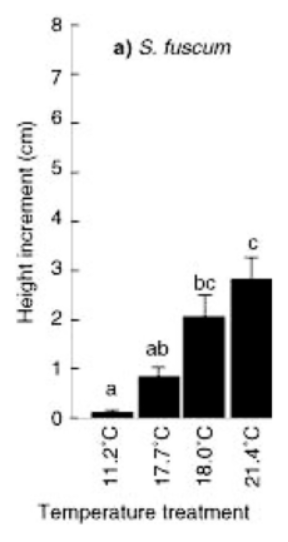
33) In an investigation of Sphagnum growth, researchers measured the growth of four different S. fuscum species (labeled a, ab, bc, and c in the figure) at four temperatures. The results of the investigation are represented in the graph. Which of the following claims is most consistent with the data?
A. S. fuscum species are best adapted to growth in cold climates.
B. S. fuscum species are best adapted to live in warm climates.
C. S. fuscum species grow slower at warmer temperatures.
D. S. fuscum species grow faster at moderate temperatures.
B
34) A botanist discovers a new species of plant in a tropical rain forest. Investigation of its anatomy and life cycle shows the following characteristics: flagellated sperm, xylem with tracheids, separate gametophyte, sporophyte generations with the sporophyte dominant, and no seeds. To which of the following groups does this plant most likely belong?
A. flowering plants
B. gymnosperms
C. ferns
D. mosses
C
35) Use the following information to answer the question. Big Bend National Park in Texas is mostly Chihuahuan desert, where rainfall averages about 25 centimeters per year. Yet, it is not uncommon when hiking in this extremely arid zone to encounter mosses and ferns. One such plant is called "flower of stone." It is not a flowering plant, nor does it produce seeds. Under arid conditions, its leaflike structures curl up. However, when it rains, it unfurls its leaves, which form a bright green rosette on the desert floor. Consequently, it is sometimes called the "resurrection plant." At first glance, it could be a fern, a true moss, or a spike moss. Which of the following characteristics is (are) possessed in common by true mosses, ferns, and spike mosses, and therefore becomes useless at helping to determine to which of these groups "flower of stone" belongs?
A. flagellated sperm and true leaves and roots
B. flagellated sperm and alternation of generations
C. alternation of generations
D. a sporophyte generation that is dominant and alternation of generations
B
36) As global temperatures continue to rise, the water levels of some peatlands are expected to drop, exposing the peat to the air and causing it to decompose. Which of the following is most likely to result from this change in water levels?
A. peatlands would become larger in size, and aid in the removal of carbon dioxide from the atmosphere
B. the decomposition would cause the release of less carbon dioxide into the air, and have no effect on global warming
C. peatlands would become smaller in size, and aid in the removal of carbon dioxide from the atmosphere
D. the decomposition would cause the release of more carbon dioxide into the air, further contributing to global warming
D
37) Suppose that the cells of seed plants, like the cells of human skin, produce a pigment upon increased exposure to ultraviolet radiation. Which of the following types of plant cells is most likely to produce this pigment?
A. vascular cells in the root
B. epidermal cells of sporophyte megaphylls
C. cells of a gametophyte
D. cells of a megasporangium
B
38) Which answer arranges the characteristics of plants in the order in which they evolved, from most ancient to most recent?
A. gametophyte dominance, sporophyte dependence; sporophyte dominance, gametophyte independence; sporophyte dominance, gametophyte dependence
B. sporophyte dominance, gametophyte independence; sporophyte dominance, gametophyte dependence; gametophyte dominance, sporophyte dependence
C. gametophyte dominance, sporophyte dependence; sporophyte dominance, gametophyte dependence; sporophyte dominance, gametophyte independence
D. sporophyte dominance, gametophyte dependence; sporophyte dominance, gametophyte independence; gametophyte dominance, sporophyte dependence
A
39) One day, you go outside and see that the cars on the street are covered in a yellow "dust." Which of the following statements can be correctly applied to this "dust"?
A. The dust is the spore production of ferns and is so abundant because the spores are wind-dispersed.
B. The dust is the seed production of ferns and is so abundant because the seeds are tiny and take very little energy to produce.
C. The dust is the seed production of pines and is so abundant because the seeds are tiny and take very little energy to produce.
D. The dust is pine pollen and is so abundant because the pines are wind-pollinated.
D
40) Within a gymnosperm megasporangium, which of the following develops before the others after fertilization occurs?
A. egg cell
B. female gametophyte
C. megaspore
D. sporophyte embryo
C
41) Many types of plants produce fruit which is eaten by animals. The seeds of these plants are typically undigestible. Which of the following is an advantage for plants having undigestible seeds?
A. It provides a source of nutrients for the germinating seed.
B. It allows seeds to reside in the gut until conditions are appropriate for germination.
C. It ensures that flowers of these plants will be pollinated.
D. It allows the seeds to be dispersed into other areas.
D
42) The Brazil nut tree, Bertholletia excels, is native to tropical rain forests of South America and produces large nuts. The large white part of a Brazil nut that people eat serves which of the following functions in nature?
A. It attracts birds and encourages them to nest in the tree.
B. It serves as protection for the embryo from animals looking for food.
C. It provides a water source for the developing embryo.
D. It provides energy and nutrition to a germinating seedling.
D
43) Which of the following could best be investigated by measuring fruit production in plants?
A. primary productivity
B. phototropism
C. pollination success
D. seed dispersal success
C
44) Use the information to answer the following question.Scarlet gilia (Ipomopsis aggregata) usually has red flowers. In certain populations in the Arizona mountains, however, the flowers range from red to pink to white. In early summer, most (but not all) of the flowers were red. In late summer, the same individual plants were still present; the flowers ranged from pink to white, and few red flowers were present. The table below describes the pollination process in these plants. Late in the season, when only hawk moths were present, researchers painted the red flowers white. Which of the following results is most likely in this situation?
A. Unpainted red flowers would produce the same number of fruits as the white flowers.
B. Red flowers painted white would produce more fruits than red flowers would.
C. Unpainted red flowers would produce more fruits than white flowers would.
D. Red and white flowers would produce the same numbers of fruits.
B
45) Use the information to answer the following question.Scarlet gilia (Ipomopsis aggregata) usually has red flowers. In certain populations in the Arizona mountains, however, the flowers range from red to pink to white. In early summer, most (but not all) of the flowers were red. Six to eight weeks later, the same individual plants were still present; the flowers ranged from pink to white, and few red flowers were present. The major pollinators early in the season were two species of hummingbirds active during the day; they emigrated to lower elevations, and the major pollinator later in the season was a hawk moth (a type of moth). The hawk moth was most active at sunset and later, and it preferred light pink to white flowers after dark. When hummingbirds were present, more red flowers than white flowers produced fruit. When only hawk moths were present, more white flowers produced fruit. Which of the following proposed controls would be most appropriate for the experiment when, late in the season, scientists painted some of the red flowers white?
A. A necessary control would be to put red paint on some of the red flowers in order to control for the effects of paint.
B. Plants with light and dark colored flowers should be fertilized.
C. Some red and light colored flowers should be covered to prevent pollinator access.
D. Some red flowers should be painted pink
A
46) Which of the following structures in an angiosperm is triploid?
A. endosperm
B. cotyledons
C. gametophyte
D. micropyle
A
47) Which of the following is the most beneficial adaptation of the seed coats in angiosperm species whose seeds are dispersed by fruit-eating animals, as opposed to angiosperm species whose seeds are dispersed by other means?
A. The seed coat should contain secondary compounds that irritate the lining of the animal's mouth.
B. The seed coat, upon its complete digestion, should provide nutrients to animals.
C. The exterior of the seed coat should have barbs or hooks.
D. The seed coat should be resistant to the animal's digestive enzymes.
D
48) Among plants known as legumes (beans, peas, alfalfa, clover, for example) the seeds are contained in a fruit that is itself called a legume, better known as a pod. Upon opening such pods, it is commonly observed that some ovules have become mature seeds, whereas other ovules have not. Which of the following statements best explains this observation?
A. Pollen tubes did not enter all of the ovules in such pods, and fruit can develop even if all ovules within have not been fertilized.
B. The flowers that gave rise to such pods were not pollinated, and fruit can develop even if all ovules within have not been fertilized.
C. Pollen tubes did not enter all of the ovules in such pods, and the ovules that failed to develop into seeds were derived from sterile floral parts.
D. There was apparently not enough endosperm to distribute to all of the ovules in such pods, and fruit can develop even if all ovules within have not been fertilized.
A
49) Use the information to answer the following question. Oviparous (egg-laying) animals have internal fertilization (sperm cells encounter eggs within the female's body). Yolk and/or albumen is (are) provided to the embryo, and a shell is then deposited around the embryo and its food source. Eggs are subsequently deposited in an environment that promotes their further development, or are incubated by one or both parents. The yolk of an animal egg is similar to which of the following structures in angiosperms?
A. endosperm
B. carpels
C. seed coat
D. fruit
A
50) Use the information to answer the following question. Theobroma cacao (cacao) is the tree that produces seeds that are turned into chocolate. These trees provide many poor people in the tropics with some cash income. However, these farmers face many obstacles to production of their crop, including temperature and rainfall changes caused by atmospheric CO2 increases, and many diseases and pests. Analysis of the cacao genome showed that there is some (but not a lot) of genetic variation in the 10 major varieties. Which of the following strategies would be most useful in the long term in reducing pressures faced by cacao farmers?
A. Crossbreed cacao strains that produce high-quality cacao beans and ones resistant to a disease.
B. Plant more trees in the temperate zone.
C. Plant trees farther apart so that disease transmission rates from one tree to the next will be lower.
D. Fertilize the trees in closely spaced areas and add fungicides and pesticides to eliminate pests.
A